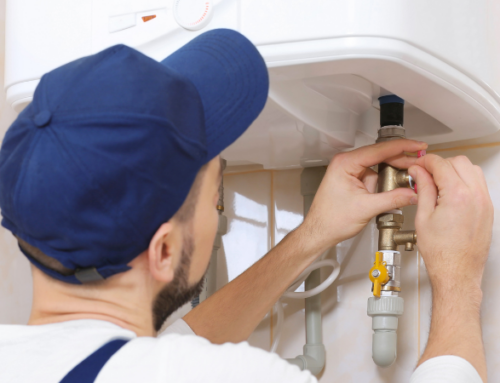Too Hot or Too Cold
There are a few common issues that can cause your water heater to malfunction. If you notice your water is either lukewarm or extremely hot, there are some things you can do to troubleshoot and fix the problem.
If your water is lukewarm, this may be caused by a tripped circuit breaker or a problem with your dip tube. A dip tube is a plastic tube that directs cold water from entering your tank to the bottom of the tank. This keeps it from mixing in with your already heated hot water. If the tube is leaking or cracked it can allow the cold water to bleed into your hot water causing your water to become lukewarm.
If you notice that there is no heat coming from your unit at all, this could be caused by an issue with either one of two things: an oversized unit or an undersized one. An oversized unit will use too much energy and not meet the needs of your family while an undersized one might not be able to keep up with hot water demand during peak hours of usage (like right before dinner).
Hot water isn’t just an annoyance—it can be dangerous. When your water heater is set to a temperature that’s too high, the hot water can cause scalding or burns. You can also start to notice corrosion on pipes, fittings, and fixtures in your home as well.
If you do notice that your water heater is too hot, there are a few things you can do to lower the temperature. For traditional gas heaters, adjusting the temperature is as simple as manually lowering the temperature dial. On electric models, remove the access panel covers and, using a screwdriver, lower the temperature setting. It’s a good idea to lower your temperature settings when you’re going away as it saves energy and money.
Leaks
Water leaks are a common problem for tank water heaters. If you have an older tank, it may be time to replace it. Leaking tanks can easily turn into a basement flooded with water. Some causes of leaking are an old tank, a worn drain valve, improper water pressure, leaking plumbing connections, and a faulty temperature and pressure relief valve. Tanks older than 15 years should be routinely replaced to avoid flooding disasters. Emptying the tank for routine maintenance can cause the drain, over time, to fail and can leak. If water is entering the tank at too high of pressure or if the steam build-up within the tank becomes too great water will leak through even hair-line cracks in the tank. Too high steam build-up can be attributed to a temperature and pressure relief valve that is either loose or malfunctioning. Water enters the tank from your main water supply and exits the tank when hot water is called for in the home. The connectors to these in and out pipes can become loose and cause water to leak. Sediment collecting at the bottom of aging tanks can also cause problems. If you regularly clean out your water heater tank this collection should not result.
Something Smells Fishy
If you’ve got a water heater that smells bad, tastes bad, or looks cloudy and rusty, it’s probably time to replace the anode rod. The anode rod is a long metal rod that extends the length of your tank and attracts iron, limestone, and other minerals. In doing so, it sacrifices itself to corrosion thus extending the life of your heater.
If you are noticing any of these issues with your water heater, it’s important to keep an eye on it as soon as possible. If left unattended for too long, rust can build up in the tank and cause failure at an accelerated rate.
Pilots and Burners
If you have a tank water heater, there are a few things that can go wrong with it. A common problem is a pilot light that will not light. If your thermostat is working properly and the gas valves are clear, then your vent may be obstructed. If you find that your vent is not blocked and your thermostat is working properly, then you may have an issue with your burner orifices.
To test this, run hot water and raise and lower the temperature. If the unit fails to respond, look at the thermostat, burner orifices, or vent to be certain it is not obstructed.
Slow Water Heating
If your water heater is electric, water that is slow to the heart could be a result of either a faulty heating element or a malfunctioning thermostat. If your system is gas-powered check to be sure your heater is set at the correct gas pressure. If it is not it is time to clean the burner orifices to ensure proper heating of your water.
If your water heater is electric and has been running continuously for several days without being used, you may need to reset the breaker switch on the unit. This should only be done if you have checked all other possibilities first.
In some cases, an electric system can be too large for its space. If this is true in your case, consider replacing it with a smaller unit that will fit better or installing an additional tank so that both tanks can operate simultaneously.
Hot water heaters are an essential home appliance and, if maintained routinely, will give you years of dependable service. Addressing water temperature issues, visually looking for leaks, being aware of the condition of your water, and maintaining your heater’s parts will add to its efficiency and prevent costly disasters in the future.
Thinking of upgrading your old tank water heater with a brand new, cost-effective, tankless water heater? Contact us today! We are water heater replacement experts in Vista, North County.






